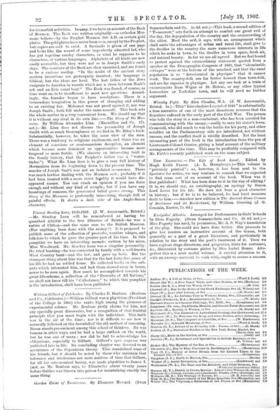The Pounder of Mormonism. By J. Woodbridge Riley. (Dodd, Mead,
and Co., New York.)—This volume is an outcome of the excellent system by which the higher degrees of certain American Universities are awarded for theses written by the can- didate. Mr. Riley obtained his M.A. at Yale by a treatise on the "Metaphysics of Mormonism," and he now grounds an appli- cation for Ph.D. on the volume before us. He begins by investi- gating the family history. Here the record is strongly coloured by experiences of hallucination, vivid dreams, Ste. Several of Joseph Smith's ancestors were morbid in a high degree, not far removed, in fact, from insanity. Then we have an account of the "Prophet's" surroundings. A society in which there was little education and a great amount of religious emotion, showing itself sometimes in controversy, sometimes in revivals, was just the place where such a personality as Joseph Smith would find free scope
for its morbid activities. In tamp. 3 we have an account of the Book of Mormon. The Book was written originally—so orthodox Mor- mons believe—by the Prophet Mormon 300 A.D. on certain gold plates. The gold plates have never been seen, except by the Prophet, but copies are said to exist. A facsimile is given of one page and looks like the scrawl of some imperfectly educated lad; who has put together sundry characters, or what he supposes to be characters, of various languages. Alphabets of all kinds are now easily accessible, but they were not so in Joseph Smith's early days. The contents of the Book are then examined, and are found to be a curious medley. "In the midst of the ancient story modern inventions are grotesquely inserted; the language is biblical, but the ideas are local. The lost tribes of the Jews emigrate to America in vessels which are a cross between Noah's ark and an Erie canal boat." The Book was found, of course, as time went on, to be insufficient to meet new questions. Accord- ingly, the founder began to have revelations. There is a tremendous temptation in this power of changing and adding to an existing law. Mehemet was not proof against it, nor was Joseph Smith ; both fell under the same assault. This book sets the whole matter in a very convenient form. We should say that it is without any rival in its own line.—The Story of the Mor- mons. By William Alexander Linn. (Macmillan and Co. 17s. net.)—Mr. Linn does not discuss the personality of Joseph Smith with so much thoroughness as we find in Mr. Riley's book. Substantially, however, he takes the same view of the man. There was a tendency to religious excitement, and there was an element of conscious or semi-conscious deception, an element which became more dominant as opportunities became more frequent or more fertile. (We observe an interesting trait in the family history, that the Prophet's father was a "water- finder.") What Mr. Linn does is to give a very full history of Mormonism from its beginning down to the present time. The murder of Joseph Smith was not an isolated occurrence. There was much lawless dealing with tho Mormon sect ; probably if it had been treated with a more strict legality it would have dis- appeared sooner. You can crush an opinion if you use force enough and without any kind of scruple ; but if you have any hauntings of remorse, the persecuted belief grows strong. This
Story of the Mormons is profoundly interesting, though full of painful effects. It shows a dark side of the Anglo-Saxon character.



































 Previous page
Previous page